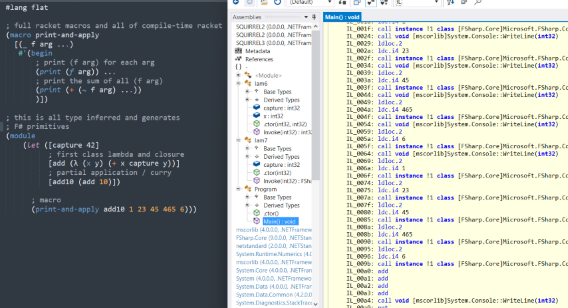Rangi!
The friendly neighbourhood volcano, and embarking upon a CLR executable metadata jungle expedition

The friendly neighbourhood volcano, and embarking upon a CLR executable metadata jungle expedition

Flat is a project from way back in 2019. The idea was to build a .NET language in Racket, surfacing the Racket macro system alongside a .NET runtime.

(sorry for the rubbish picture, the scaling killed it)
Multiplexers and demultiplexers are common tools in digital logic design. In Verilog, they are fairly simple to create whilst the amount of signals are small. In this post we’ll look at how Fairylog’s macros can make short work of generating mux/demux of any complexity, greatly reducing the amount of work and scope for hard-to-find bugs

Over the last few months I have been working on yet another new language, this time for programming FPGAs. This post will provide a short introduction to Fairylog by way of building some custom hardware to read a pair of Nintendo pads.
Realtime 24bit colour rotozoomer controlled by a NES pad. CPU, video hardware and assembler built in my various @racketlang langs. Display from @adafruit. Debugger and supporting tools #csharp & #fsharp. Complete with dramatic music! 😃 #fpga pic.twitter.com/8gVNfg4uLD
— Ross McKinlay (@pezi_pink) March 7, 2019
In this post we will see how asi64’s (Racket’s) macro system can massively reduce the amount of 6502 assembly code you have to write, beyond what a typical macro assembler can achieve.
In this post we will see how asi64 is more than your average macro assembler, by combining arbitrary disk io, functional programming techniques and code generation alongside your typical 6502 assembly code. The aim is to create a very simple sprite animation viewer, that writes the resulting C64 program by interleaving file parsing and machine code generation.
Here’s the program displaying some sprites that @silverspoon has started working on :) (in different, single colours for the fun of it)

The previous post layed the foundations of creating a language and “compiler” using Racket macros.
This is all very nice, but utimately it is just a bunch of macros. The “language” itself doesn’t have any form of enforced semantics. You can introduce whatever syntax and macros you want, and use them however you like, even if it makes no sense at all.
Whilst this is nice in a way (and can lead to some .. interesting .. “features”) it is often more of a pain than it’s worth. Most of the errors we make in our day to day programming are picked up immediately by the background compiler, or the full compilation. Silly things like “clipboard inheritance” or typos attempting to use bindings that aren’t in scope are high on the list of culprits here.
In this post we will see how Racket can be used to help out by doing some lexical scope “analysis” in a slightly different way from a traditional compiler. We will also see how Racket can redefine its entire notion of function application, which will allow us to introduce some very nifty new syntax into Scurry itself.
This post will be about Racket macros. As a delivery mechanism, I will be using bits of my latest project, which is a virtual machine designed for emulating multiplayer networked board games via ZeroMQ. drey-vm executes compiled bytecode files - much like the CLR or JVM - using an instruction set of my design.
The design of the computer is out of the scope of this post (maybe another post if people are interested in it - let me know in the comments!?) suffice to stay it is written in D and is mostly a stack based computer, supporting functional and imperative programming. It has a string/object dictionary as its primary type,like lua and js.
Much like asi64, I wrote an assembler for the virtual machine in Racket. On top of that assembler I can now build a language (scurry). To start with, I am just creating a Racket language that is still a lisp - Racket has the fantasic power of being able to build macros on macros, gradually introducing higher level syntatic forms. In this way, I don’t really need write an actual compiler. Racket gives me the front end of the compiler for free (being lisp), and the macros-over-assembler method is a very fun and flexibile way to build up a language.
In my last few posts, I detailed some of my experience learning 6502 assembler for the Commodore 64. I started off using DASM, which seems to be quite a nice assembler, severely lacking in documentation. Then I discovered the very awesome KickAssembler, which includes a full blown scripting language on top of java, lots of other very nice features, and great documentation. This made me realise what a powerful modern assembler could be like - and perhaps I could go one step further with it.
Asi64 extends Racket to become a 6502 assembler. No need for scripting languages or half baked macro systems here - you have literally all of Racket and its amazing macro system on your side. It also has direct support for Vice, a popular Commodore 64 emulator, passing your labels and breakpoints along enabling a fluid programming and debugging cycle. Hats off to the fantasic KickAssembler, I have stolen many ideas from it :)

Over the last few days I have been learning Racket, a language derived from Scheme. The main selling point of Racket is its extensive macro system that lets you do everything from the simplest macros through to redefining the entire language (yes you can even get rid of the parens!). It is a programming language programming language. In fact, Racket is more of a customisable programming language infrastructure / engine with a default language on top of it.